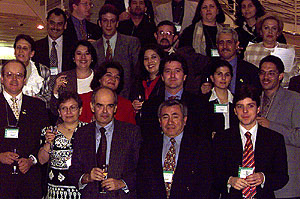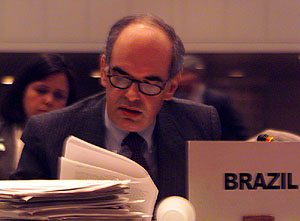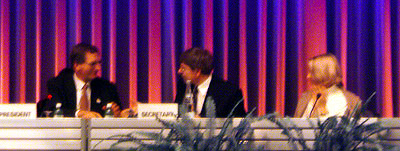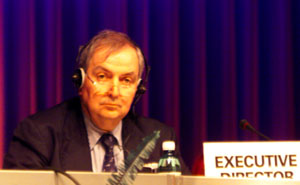|

|

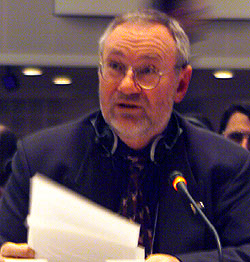 Australian
delegate, Mark Hyman of Environment Australia voices
concerns over certain elements of the text of the Protocol.
Australia argues that the Protocol's questionable applicability
may cause uncertainty between regimes, potentially creating
confusion, increasing costs, and resulting in protracted litigation
suits. Furthermore, the effect of channeling liability to
the exporter rather than those in operational control, is
argued as not properly reflecting the 'polluter-pays' principle.
Australia's comments on Annex B include concern over financial
limits being determined by domestic law without centralized
guidance, and that a conflict of interest may arise if minimum
liability levels were established by the regimes of individual
Parties - policies which other Parties would not be able to
influence. The overall effect is thus argued to not adequately
provide certainty or consistency of application of the Protocol.
Australia believes that maximum limits should be set in the
Protocol text and that they should be set lower than is proposed,
and since minimum liability limits are purely quantitative
measured in tonnage, they ignore qualitative indicators of
hazard risk. Thus, Australia feels that the Protocol text
has serious deficiencies and that it needs to be made more
viable and practical in order to expedite ratification of
the Parties to the Basel Convention. Canada aligned itself
with Australia's concerns. Australian
delegate, Mark Hyman of Environment Australia voices
concerns over certain elements of the text of the Protocol.
Australia argues that the Protocol's questionable applicability
may cause uncertainty between regimes, potentially creating
confusion, increasing costs, and resulting in protracted litigation
suits. Furthermore, the effect of channeling liability to
the exporter rather than those in operational control, is
argued as not properly reflecting the 'polluter-pays' principle.
Australia's comments on Annex B include concern over financial
limits being determined by domestic law without centralized
guidance, and that a conflict of interest may arise if minimum
liability levels were established by the regimes of individual
Parties - policies which other Parties would not be able to
influence. The overall effect is thus argued to not adequately
provide certainty or consistency of application of the Protocol.
Australia believes that maximum limits should be set in the
Protocol text and that they should be set lower than is proposed,
and since minimum liability limits are purely quantitative
measured in tonnage, they ignore qualitative indicators of
hazard risk. Thus, Australia feels that the Protocol text
has serious deficiencies and that it needs to be made more
viable and practical in order to expedite ratification of
the Parties to the Basel Convention. Canada aligned itself
with Australia's concerns.
Philippe Roch, accepted Australia's
remarks, taking them to mean that Australia was not opposed
to the adoption of the Protocol, and that those remarks will
be integrated in the Report of the Secretariat.
|
|
|
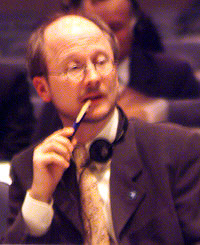 [left]
Speaking
on behalf of the European Union, Tuomas Aarnio from Finland
Ministry of Environment offers support for the Protocol from the EU. He adds that the EU
is aware that funding is of prime importance to the effective implementation
of the Protocol, and that EU member states are seriously considering
a commitment to the Technical Cooperation Trust Fund for emergency
cases. [left]
Speaking
on behalf of the European Union, Tuomas Aarnio from Finland
Ministry of Environment offers support for the Protocol from the EU. He adds that the EU
is aware that funding is of prime importance to the effective implementation
of the Protocol, and that EU member states are seriously considering
a commitment to the Technical Cooperation Trust Fund for emergency
cases.
|
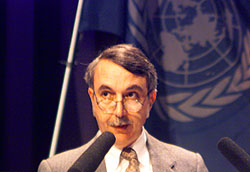  Daniel
T. Fantozzi of
the US Department of State speaks on behalf of the United States delegation
observing the COP5 [right].
Daniel
T. Fantozzi of
the US Department of State speaks on behalf of the United States delegation
observing the COP5 [right].
While
the US is not Party to the Basel Convention and the issue of ratification
has not yet reached the Congressional agenda, delegates observing the
COP-5 made a statement reassuring the country's interest in further participation.
Fantozzi,
Director of the Office of Environmental Policy with the US Department
of State's Bureau of Oceans, Environment and Scientific Affairs, noted
that the observing delegation was proud to have two senior Congressional
representatives working with them, carrying the legacy of one of the US's
most ardent Basel Convention supporters, the late Senator Chafee. More
substantive examples of the US's interest included cross-border agreements
with Canada, an indefinite moratorium on the deconstruction of ships,
and their voluntary contributions being the 3rd largest.
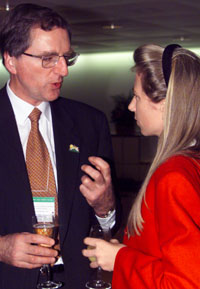 [left]
Philippe Roch, State Secretary, Head of the Swiss Agency for
the Environment, Forests and Landscape (SAEFL) and Basel COP5 President,
shares a toast with Juliette Voinov of the Earth Negotiations
Bulletin, International Institute for Sustainable Development (IISD). [left]
Philippe Roch, State Secretary, Head of the Swiss Agency for
the Environment, Forests and Landscape (SAEFL) and Basel COP5 President,
shares a toast with Juliette Voinov of the Earth Negotiations
Bulletin, International Institute for Sustainable Development (IISD). |

[above]
Delegates of the Conference of the Parties celebrate the adoption
of the Protocol at a champagne reception hosted by the Basel Convention
Secretariat, the Swiss Government, and the United Nations Environment
Program.
|
|



